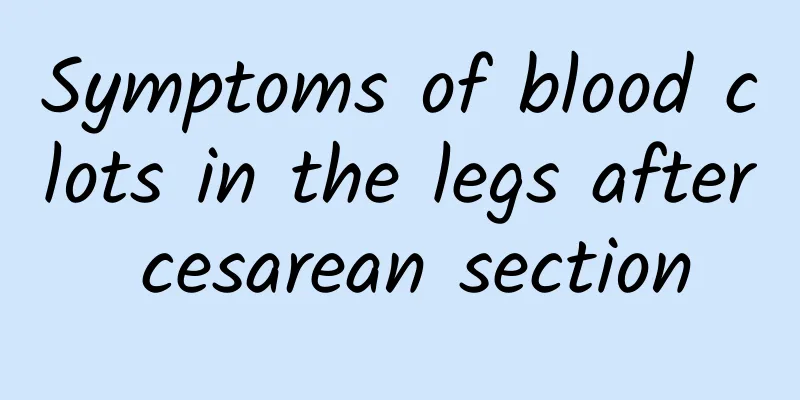Symptoms of blood clots in the legs after cesarean section

|
For mothers who have undergone cesarean section, as their bodies gradually recover, they should exercise moderately and not stay in bed for long periods of time, as this can easily lead to blood clots, which can have a great impact on their health. If venous thrombosis occurs in the lower limbs, it can even pose a great threat to the life of the mother. You must pay attention to this aspect. If limb swelling or pain occurs, consult a doctor in time and use appropriate methods to prevent and treat it. 1. Swelling of the affected limb The affected limb has high tissue tension, reddish skin, higher skin temperature than the healthy side, and non-pitting edema. In severe cases, blisters may appear on the skin. There are also differences in the different swelling locations at the site of the blood clot. The swelling is usually most severe on the second or third day after the onset of the disease, and then gradually subsides. When it subsides, it first manifests as a decrease in tissue tension, and then a gradual reduction in the circumference of the affected limb, but it is difficult to return to its original state. 2. Pain and tenderness The blood clot causes an inflammatory reaction in the vein, causing persistent pain in the affected limb; the blood clot blocks the vein and obstructs venous return to the lower limb, causing swelling and pain in the affected limb, and the pain worsens when standing upright. Tenderness is mainly confined to the site of inflammatory response to venous thrombosis, such as the femoral vein or calf. Calf gastrocnemius tenderness is also called a positive Homans sign. 3. Superficial varicose veins Superficial varicose veins are a compensatory reaction and are generally not obvious in the acute phase, often manifesting as sequelae. When the main vein is blocked, the venous blood in the lower limbs returns through the superficial veins, causing the superficial veins to dilate compensatorily. 4. White swelling of thigh When acute deep vein thrombosis occurs in the lower extremities, the symptoms of leg thrombosis are swelling that is concave and high tension. The lower extremity edema reaches its highest level within a few hours, and the obstruction mainly occurs in the femoral venous system. When infection occurs, painful white swelling occurs, manifested as persistent spasm of the stimulated artery, with visible pale skin, swelling of the entire limbs, and dilation of the subcutaneous reticular venules. 5. Swelling of the thigh It causes spasm of the lower limb arteries, limb ischemia or even necrosis, shiny skin of the affected limb, accompanied by blisters or blood blisters, severe pain, and a bluish-purple skin color, which is called painful cerulea femoris. Symptoms of leg thrombosis are often accompanied by arterial spasm, decreased skin temperature, weakened or disappeared lower limb arterial pulsation, and then high-degree circulatory disorders. High fever, mental fatigue, prone to shock and wet gangrene of the lower limbs. |
<<: How to treat arm vein thrombosis
>>: How to prevent venous thrombosis after cesarean section
Recommend
What medicine can delay menstruation?
Generally speaking, doctors do not recommend post...
Early symptoms of neuropathy
Neurosis, which is what we usually call mental il...
Varicose veins and purple ankles
Purple ankles are usually caused by varicose vein...
Loquat leaves, a traditional Chinese medicine for clearing the lungs and lowering qi
I believe many people are familiar with loquats. ...
Is it painful to test for mycoplasma in men?
For men, if mycoplasma infection occurs, timely e...
What is the mixed echo of the thyroid gland?
During the examination, if mixed echoes of the th...
The waist suddenly hurt and it healed immediately
Because of work, many people sit in the office fo...
What is the reason for black spots on the buttocks?
Black spots on the buttocks are quite common in l...
What medicine is good for vocal cord polyps
Nowadays, people in our daily life do not pay muc...
What to do if your butt hurts? Chinese medicine teaches you to eat the right foods to reduce internal heat
Buttock pain caused by getting angry is an embarr...
Effects of magnesium sulfate infusion in pregnant women
Magnesium sulfate injection is an anticonvulsant ...
Why does my chest hurt more when it's colder?
Breast pain is a common symptom and a problem tha...
How to repair damaged skin caused by facial allergy, itching and scratching
For people with allergic constitutions, skin alle...
Is moxibustion effective for weight loss?
Moxibustion does have a very ideal effect in weig...
Symptoms of paronychia, have you been infected?
Paronychia can also be considered a skin disease....









